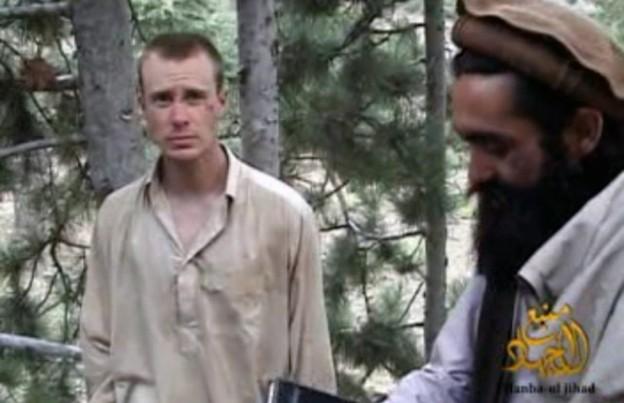Among service men and women, the debate rages over Bowe Bergdahl
A man believed to be Bowe Bergdahl is pictured in a frame grab from a video released by the Taliban. The image was released by IntelCenter on Dec. 8, 2010.
So I saw this post on Facebook the other day: "I want to make sure I understand the point," my friend said, referring to the Bergdahl deal. "Was this all just a White House PR thing to 'bring our soldier home'… This is a horrible policy decision, one of the worst. Can anyone tell me what the point was?"
"The point is that Bowe Bergdahl is an American soldier, he is an American citizen. We should do everything in our power to get him back. Everybody should know that if you're out there, we're gonna come get you," said retired Brigadier General Kevin Ryan, who is now at Harvard's Kennedy School of Government.
But what if Bergdahl did something that put fellow soldiers in danger?
"He may be a bastard," General Ryan said, "but he's our bastard, not the Taliban's. And I don't know what Bergdahl did, but let's assume that he walked off of his base, that he went AWOL. Lots of soldiers go AWOL. AWOL is walking away from your unit for less than 30 days without the intent really to desert for longer. So who knows what was going through his mind. But when the Taliban picked him up, he was no longer AWOL — he was a prisoner of war."
So there you go.
Problem solved, case closed. Or not.
We got lots of responses when we asked veterans who are fans of PRI's The World to weigh in.
There was near-universal support for the doctrine "leave no man behind."
But that doesn't mean it's open and shut.
Juan Franco served in Operation Iraqi Freedom 2 from 2004-2005. "What really got me," he said, "was that when you walk away from your post, when you walk away from your area of responsibility, I consider you a traitor."
Greg Walters is a retired fighter pilot and has served in every conflict since the first Gulf War. He says, "When you sign on the dotted line in an all-volunteer force, you make the decision that, 'Hey man, I'm going into the military at peril of my life.'"
For him, "the basic soul of what a soldier is all about is he doesn't want to put his soldiers or civilians in peril for his life. I've seen five of my fighter pilot peers shot down. Two were POW's, two were killed and one was returned, picked up by a helicopter. So I've been there."
"When I keep hearing people talk about [how] they are willing to do anything to get an American back, well, if you ask the American soldier, myself included, I don't want to come back at the risk of my country. In other words, the purpose of me being a soldier is to go fight for my country, to protect the country," Walters said.
General Kevin Ryan gets that: "I understand people's reactions that say, you know, 'screw him.'" He acknowledges this is an emotional issue, but he says you can't judge a guy before you know the facts. You gotta just get him.
"Politicians deserve to weigh in on this," Ryan says. "Americans deserve to weigh in on this. People who disagree with what I'm saying, they've got a right to weigh in on this. But if Bergdahl committed a crime, if there's something he needs to answer for, then he should do it here and not in a prison in Afghanistan or Pakistan."
So there you have it, my Facebook friend … bringing a possible deserter home might not be a policy you like, and it might not be popular among all soldiers …
But it's what we do.
If you want to join the group of veterans and their families and friends who help PRI's The World with our reporting on military issues, text "Return" to 69866.
Every day, reporters and producers at The World are hard at work bringing you human-centered news from across the globe. But we can’t do it without you. We need your support to ensure we can continue this work for another year.
Make a gift today, and you’ll help us unlock a matching gift of $67,000!
